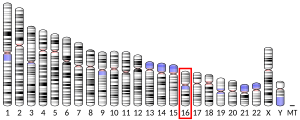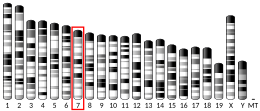STX4
Appearance
Syntaxin-4 is a protein that in humans is encoded by the STX4 gene.[5][6][7]
Interactions
[edit]STX4 has been shown to interact with:
References
[edit]- ^ a b c GRCh38: Ensembl release 89: ENSG00000103496 – Ensembl, May 2017
- ^ a b c GRCm38: Ensembl release 89: ENSMUSG00000030805 – Ensembl, May 2017
- ^ "Human PubMed Reference:". National Center for Biotechnology Information, U.S. National Library of Medicine.
- ^ "Mouse PubMed Reference:". National Center for Biotechnology Information, U.S. National Library of Medicine.
- ^ Li H, Hodge DR, Pei GK, Seth A (Jun 1994). "Isolation and sequence analysis of the human syntaxin-encoding gene". Gene. 143 (2): 303–4. doi:10.1016/0378-1119(94)90117-1. PMID 8206394.
- ^ Low SH, Vasanji A, Nanduri J, He M, Sharma N, Koo M, Drazba J, Weimbs T (Feb 2006). "Syntaxins 3 and 4 are concentrated in separate clusters on the plasma membrane before the establishment of cell polarity". Molecular Biology of the Cell. 17 (2): 977–89. doi:10.1091/mbc.E05-05-0462. PMC 1356605. PMID 16339081.
- ^ "Entrez Gene: STX4 Syntaxin 4".
- ^ Kalwat MA, Wiseman DA, Luo W, Wang Z, Thurmond DC (January 2012). "Gelsolin associates with the N terminus of syntaxin 4 to regulate insulin granule exocytosis". Molecular Endocrinology. 26 (1). Baltimore, Md.: 128–41. doi:10.1210/me.2011-1112. PMC 3248323. PMID 22108804.
- ^ a b Rual JF, Venkatesan K, Hao T, Hirozane-Kishikawa T, Dricot A, Li N, Berriz GF, Gibbons FD, Dreze M, Ayivi-Guedehoussou N, Klitgord N, Simon C, Boxem M, Milstein S, Rosenberg J, Goldberg DS, Zhang LV, Wong SL, Franklin G, Li S, Albala JS, Lim J, Fraughton C, Llamosas E, Cevik S, Bex C, Lamesch P, Sikorski RS, Vandenhaute J, Zoghbi HY, Smolyar A, Bosak S, Sequerra R, Doucette-Stamm L, Cusick ME, Hill DE, Roth FP, Vidal M (Oct 2005). "Towards a proteome-scale map of the human protein-protein interaction network". Nature. 437 (7062): 1173–8. Bibcode:2005Natur.437.1173R. doi:10.1038/nature04209. PMID 16189514. S2CID 4427026.
- ^ Li L, Omata W, Kojima I, Shibata H (Feb 2001). "Direct interaction of Rab4 with syntaxin 4". The Journal of Biological Chemistry. 276 (7): 5265–73. doi:10.1074/jbc.M003883200. PMID 11063739.
- ^ a b Hata Y, Südhof TC (Jun 1995). "A novel ubiquitous form of Munc-18 interacts with multiple syntaxins. Use of the yeast two-hybrid system to study interactions between proteins involved in membrane traffic". The Journal of Biological Chemistry. 270 (22): 13022–8. doi:10.1074/jbc.270.22.13022. PMID 7768895.
- ^ a b Ravichandran V, Chawla A, Roche PA (Jun 1996). "Identification of a novel syntaxin- and synaptobrevin/VAMP-binding protein, SNAP-23, expressed in non-neuronal tissues". The Journal of Biological Chemistry. 271 (23): 13300–3. doi:10.1074/jbc.271.23.13300. PMID 8663154.
- ^ a b Reed GL, Houng AK, Fitzgerald ML (Apr 1999). "Human platelets contain SNARE proteins and a Sec1p homologue that interacts with syntaxin 4 and is phosphorylated after thrombin activation: implications for platelet secretion". Blood. 93 (8): 2617–26. doi:10.1182/blood.V93.8.2617. PMID 10194441.
- ^ a b Steegmaier M, Yang B, Yoo JS, Huang B, Shen M, Yu S, Luo Y, Scheller RH (Dec 1998). "Three novel proteins of the syntaxin/SNAP-25 family". The Journal of Biological Chemistry. 273 (51): 34171–9. doi:10.1074/jbc.273.51.34171. PMID 9852078.
- ^ a b Imai A, Nashida T, Yoshie S, Shimomura H (Aug 2003). "Intracellular localisation of SNARE proteins in rat parotid acinar cells: SNARE complexes on the apical plasma membrane". Archives of Oral Biology. 48 (8): 597–604. doi:10.1016/s0003-9969(03)00116-x. PMID 12828989.
- ^ Li G, Alexander EA, Schwartz JH (May 2003). "Syntaxin isoform specificity in the regulation of renal H+-ATPase exocytosis". The Journal of Biological Chemistry. 278 (22): 19791–7. doi:10.1074/jbc.M212250200. PMID 12651853.
- ^ Araki S, Tamori Y, Kawanishi M, Shinoda H, Masugi J, Mori H, Niki T, Okazawa H, Kubota T, Kasuga M (May 1997). "Inhibition of the binding of SNAP-23 to syntaxin 4 by Munc18c". Biochemical and Biophysical Research Communications. 234 (1): 257–62. doi:10.1006/bbrc.1997.6560. hdl:20.500.14094/D2002245. PMID 9168999.
- ^ a b c d Paumet F, Le Mao J, Martin S, Galli T, David B, Blank U, Roa M (Jun 2000). "Soluble NSF attachment protein receptors (SNAREs) in RBL-2H3 mast cells: functional role of syntaxin 4 in exocytosis and identification of a vesicle-associated membrane protein 8-containing secretory compartment". Journal of Immunology. 164 (11): 5850–7. doi:10.4049/jimmunol.164.11.5850. PMID 10820264.
- ^ Kawanishi M, Tamori Y, Okazawa H, Araki S, Shinoda H, Kasuga M (Mar 2000). "Role of SNAP23 in insulin-induced translocation of GLUT4 in 3T3-L1 adipocytes. Mediation of complex formation between syntaxin4 and VAMP2". The Journal of Biological Chemistry. 275 (11): 8240–7. doi:10.1074/jbc.275.11.8240. PMID 10713150.
- ^ Freedman SJ, Song HK, Xu Y, Sun ZY, Eck MJ (Apr 2003). "Homotetrameric structure of the SNAP-23 N-terminal coiled-coil domain". The Journal of Biological Chemistry. 278 (15): 13462–7. doi:10.1074/jbc.M210483200. PMID 12556468.
- ^ a b Schraw TD, Lemons PP, Dean WL, Whiteheart SW (Aug 2003). "A role for Sec1/Munc18 proteins in platelet exocytosis". The Biochemical Journal. 374 (Pt 1): 207–17. doi:10.1042/BJ20030610. PMC 1223584. PMID 12773094.
- ^ a b Widberg CH, Bryant NJ, Girotti M, Rea S, James DE (Sep 2003). "Tomosyn interacts with the t-SNAREs syntaxin4 and SNAP23 and plays a role in insulin-stimulated GLUT4 translocation". The Journal of Biological Chemistry. 278 (37): 35093–101. doi:10.1074/jbc.M304261200. PMID 12832401.
- ^ Nogami S, Satoh S, Tanaka-Nakadate S, Yoshida K, Nakano M, Terano A, Shirataki H (Jul 2004). "Identification and characterization of taxilin isoforms". Biochemical and Biophysical Research Communications. 319 (3): 936–43. doi:10.1016/j.bbrc.2004.05.073. PMID 15184072.
- ^ Mollinedo F, Martín-Martín B, Calafat J, Nabokina SM, Lazo PA (Jan 2003). "Role of vesicle-associated membrane protein-2, through Q-soluble N-ethylmaleimide-sensitive factor attachment protein receptor/R-soluble N-ethylmaleimide-sensitive factor attachment protein receptor interaction, in the exocytosis of specific and tertiary granules of human neutrophils". Journal of Immunology. 170 (2): 1034–42. doi:10.4049/jimmunol.170.2.1034. PMID 12517971.
- ^ Jagadish MN, Fernandez CS, Hewish DR, Macaulay SL, Gough KH, Grusovin J, Verkuylen A, Cosgrove L, Alafaci A, Frenkel MJ, Ward CW (Aug 1996). "Insulin-responsive tissues contain the core complex protein SNAP-25 (synaptosomal-associated protein 25) A and B isoforms in addition to syntaxin 4 and synaptobrevins 1 and 2". The Biochemical Journal. 317 (3): 945–54. doi:10.1042/bj3170945. PMC 1217577. PMID 8760387.
- ^ a b Polgár J, Chung SH, Reed GL (Aug 2002). "Vesicle-associated membrane protein 3 (VAMP-3) and VAMP-8 are present in human platelets and are required for granule secretion". Blood. 100 (3): 1081–3. doi:10.1182/blood.v100.3.1081. PMID 12130530.
Further reading
[edit]- Bennett MK, García-Arrarás JE, Elferink LA, Peterson K, Fleming AM, Hazuka CD, Scheller RH (Sep 1993). "The syntaxin family of vesicular transport receptors". Cell. 74 (5): 863–73. doi:10.1016/0092-8674(93)90466-4. PMID 7690687. S2CID 37698687.
- Li C, Ullrich B, Zhang JZ, Anderson RG, Brose N, Südhof TC (Jun 1995). "Ca(2+)-dependent and -independent activities of neural and non-neural synaptotagmins". Nature. 375 (6532): 594–9. Bibcode:1995Natur.375..594L. doi:10.1038/375594a0. PMID 7791877. S2CID 4265549.
- Jagadish MN, Fernandez CS, Hewish DR, Macaulay SL, Gough KH, Grusovin J, Verkuylen A, Cosgrove L, Alafaci A, Frenkel MJ, Ward CW (Aug 1996). "Insulin-responsive tissues contain the core complex protein SNAP-25 (synaptosomal-associated protein 25) A and B isoforms in addition to syntaxin 4 and synaptobrevins 1 and 2". The Biochemical Journal. 317 (Pt 3): 945–54. doi:10.1042/bj3170945. PMC 1217577. PMID 8760387.
- Mandon B, Chou CL, Nielsen S, Knepper MA (Aug 1996). "Syntaxin-4 is localized to the apical plasma membrane of rat renal collecting duct cells: possible role in aquaporin-2 trafficking". The Journal of Clinical Investigation. 98 (4): 906–13. doi:10.1172/JCI118873. PMC 507504. PMID 8770861.
- Timmers KI, Clark AE, Omatsu-Kanbe M, Whiteheart SW, Bennett MK, Holman GD, Cushman SW (Dec 1996). "Identification of SNAP receptors in rat adipose cell membrane fractions and in SNARE complexes co-immunoprecipitated with epitope-tagged N-ethylmaleimide-sensitive fusion protein". The Biochemical Journal. 320 (Pt 2): 429–36. doi:10.1042/bj3200429. PMC 1217948. PMID 8973549.
- Tellam JT, Macaulay SL, McIntosh S, Hewish DR, Ward CW, James DE (Mar 1997). "Characterization of Munc-18c and syntaxin-4 in 3T3-L1 adipocytes. Putative role in insulin-dependent movement of GLUT-4". The Journal of Biological Chemistry. 272 (10): 6179–86. doi:10.1074/jbc.272.10.6179. PMID 9045631.
- Araki S, Tamori Y, Kawanishi M, Shinoda H, Masugi J, Mori H, Niki T, Okazawa H, Kubota T, Kasuga M (May 1997). "Inhibition of the binding of SNAP-23 to syntaxin 4 by Munc18c". Biochemical and Biophysical Research Communications. 234 (1): 257–62. doi:10.1006/bbrc.1997.6560. hdl:20.500.14094/D2002245. PMID 9168999.
- Inoue T, Nielsen S, Mandon B, Terris J, Kishore BK, Knepper MA (Nov 1998). "SNAP-23 in rat kidney: colocalization with aquaporin-2 in collecting duct vesicles". The American Journal of Physiology. 275 (5 Pt 2): F752-60. doi:10.1152/ajprenal.1998.275.5.F752. PMID 9815132.
- Reed GL, Houng AK, Fitzgerald ML (Apr 1999). "Human platelets contain SNARE proteins and a Sec1p homologue that interacts with syntaxin 4 and is phosphorylated after thrombin activation: implications for platelet secretion". Blood. 93 (8): 2617–26. doi:10.1182/blood.V93.8.2617. PMID 10194441.
- Min J, Okada S, Kanzaki M, Elmendorf JS, Coker KJ, Ceresa BP, Syu LJ, Noda Y, Saltiel AR, Pessin JE (Jun 1999). "Synip: a novel insulin-regulated syntaxin 4-binding protein mediating GLUT4 translocation in adipocytes". Molecular Cell. 3 (6): 751–60. doi:10.1016/S1097-2765(01)80007-1. PMID 10394363.
- Thomas DM, Ferguson GD, Herschman HR, Elferink LA (Jul 1999). "Functional and biochemical analysis of the C2 domains of synaptotagmin IV". Molecular Biology of the Cell. 10 (7): 2285–95. doi:10.1091/mbc.10.7.2285. PMC 25443. PMID 10397765.
- Scanlan MJ, Gordan JD, Williamson B, Stockert E, Bander NH, Jongeneel V, Gure AO, Jäger D, Jäger E, Knuth A, Chen YT, Old LJ (Nov 1999). "Antigens recognized by autologous antibody in patients with renal-cell carcinoma". International Journal of Cancer. 83 (4): 456–64. doi:10.1002/(SICI)1097-0215(19991112)83:4<456::AID-IJC4>3.0.CO;2-5. PMID 10508479.
- Paumet F, Le Mao J, Martin S, Galli T, David B, Blank U, Roa M (Jun 2000). "Soluble NSF attachment protein receptors (SNAREs) in RBL-2H3 mast cells: functional role of syntaxin 4 in exocytosis and identification of a vesicle-associated membrane protein 8-containing secretory compartment". Journal of Immunology. 164 (11): 5850–7. doi:10.4049/jimmunol.164.11.5850. PMID 10820264.
- Li L, Omata W, Kojima I, Shibata H (Feb 2001). "Direct interaction of Rab4 with syntaxin 4". The Journal of Biological Chemistry. 276 (7): 5265–73. doi:10.1074/jbc.M003883200. PMID 11063739.
- Logan MR, Lacy P, Bablitz B, Moqbel R (Feb 2002). "Expression of eosinophil target SNAREs as potential cognate receptors for vesicle-associated membrane protein-2 in exocytosis". The Journal of Allergy and Clinical Immunology. 109 (2): 299–306. doi:10.1067/mai.2002.121453. PMID 11842301.
- Dent J, Kato K, Peng XR, Martinez C, Cattaneo M, Poujol C, Nurden P, Nurden A, Trimble WS, Ware J (Mar 2002). "A prototypic platelet septin and its participation in secretion". Proceedings of the National Academy of Sciences of the United States of America. 99 (5): 3064–9. doi:10.1073/pnas.052715199. PMC 122473. PMID 11880646.
- Perskvist N, Roberg K, Kulyté A, Stendahl O (Mar 2002). "Rab5a GTPase regulates fusion between pathogen-containing phagosomes and cytoplasmic organelles in human neutrophils". Journal of Cell Science. 115 (Pt 6): 1321–30. doi:10.1242/jcs.115.6.1321. PMID 11884531.
- Polgár J, Chung SH, Reed GL (Aug 2002). "Vesicle-associated membrane protein 3 (VAMP-3) and VAMP-8 are present in human platelets and are required for granule secretion". Blood. 100 (3): 1081–3. doi:10.1182/blood.V100.3.1081. PMID 12130530.
- Scales SJ, Hesser BA, Masuda ES, Scheller RH (Aug 2002). "Amisyn, a novel syntaxin-binding protein that may regulate SNARE complex assembly". The Journal of Biological Chemistry. 277 (31): 28271–9. doi:10.1074/jbc.M204929200. PMID 12145319.




